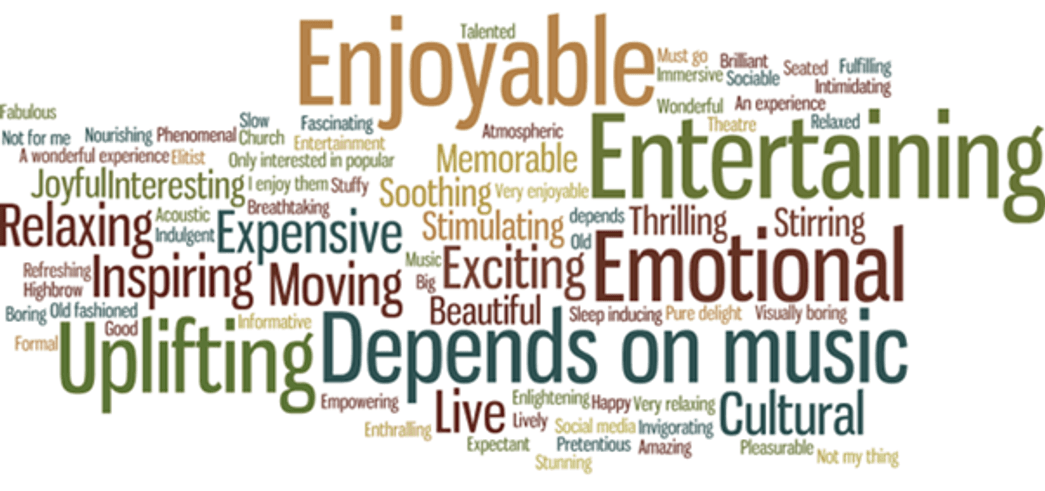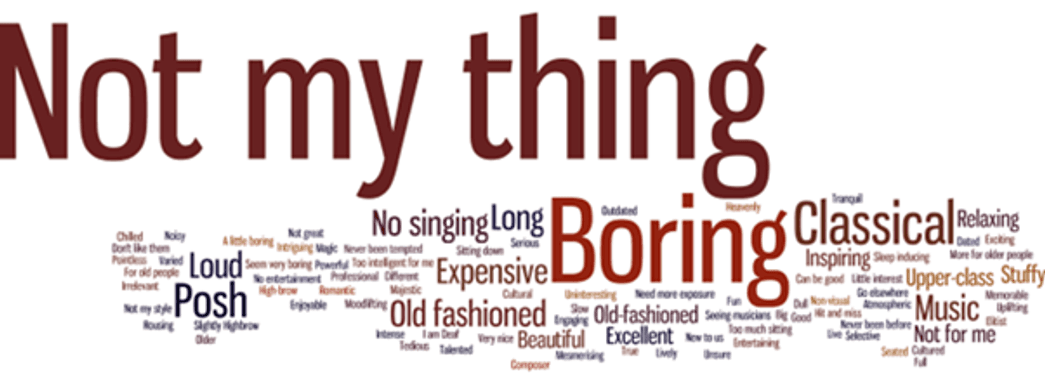Where are your audiences? Insights from new data
NewsNews Story
Production and Insight Coordinator Karys Orman, reflects on headlines from recent partner data and suggests how we can better engage audiences.
Orchestras Live’s work as a co-producer is not just about developing programmes and projects with our partners, audiences and participants, but understanding the communities we are trying to engage with on a local level. With over 50 local activity partners across England, we are able to build a picture of the wider issues facing the orchestral sector, as well as the specific challenges for our partners.
In 2019 and 2022, we ran targeted research with four of our promoter partners based across the country (North West, North East, Midlands and East) to try and better understand how to reach new orchestral audiences. Specifically, we started by reaching out to people already attending other genre events at their venues to see what might tempt them into an orchestral event. We received a total of 545 responses over four surveys. Three years on from the initial research, and a pandemic later, there are some clear similarities in what these audiences are still saying about orchestral events and why they aren’t coming.
Notwithstanding the complexities around orchestral audience development and without suggesting that there is a ‘quick fix’, the findings reconfirm that stereotypes till abound, that our marketing techniques remain a barrier and that we’re not really listening to how people might like to experience an orchestra.
Some of these audiences are already attending orchestral events and they like them
On average, 40% of respondents had been to an orchestral concert before (just not at that venue). When we asked these audiences to use three words to describe how they view orchestral concerts there was a significant difference between those who had attended an orchestral concert before and those who hadn’t. This was replicated in each area with each set of audiences surveyed, without exception.

Example wordle of responses by people who had been to an orchestral concert before to the question: Please use three words to describe how you view orchestral concerts.

Example wordle of responses by people who had never seen an orchestral concert before to the question: Please use three words to describe how you view orchestral concerts.
There is some irony in the fact that it is people who consider an orchestral concert to be ‘not their thing’, ‘boring’, ‘posh’ and ‘old-fashioned’ who have never actually been to one. What does this confirm? Although not news to anyone working in the orchestral sector, wider preconceptions remain about what an orchestral concert is. That’s not to say there aren’t many new orchestral experiences taking place all across the country, but they are not cutting through to potential new audiences.
Promotional materials need to change
When we asked some of these audiences the reasons they wouldn’t attend, there were responses like “too intelligent for me” and “I think the music titles can be intimidating”. Promotional materials often continue to be centred around lists of works and artists and not much more (soloist biographies anyone?), requiring pre-existing knowledge to understand what the event will actually include or even be like. Thus reinforcing the idea of orchestral events being exclusive and elitist.
Whilst there are some clear improvements that can be made in the language we use to talk about orchestral events, that alone won’t solve the problem. There is a limit to what inventive marketing can do to reach new audiences if the programmes they are being asked to sell are the same old thing. How much better could it be if programming and marketing teams were looking at these issues together?
Who are your performances for?
Surely, one might hope, the audiences. So, have you asked them what they want? We did. There were ambitious, expensive and fascinating requests – including “orchestral versions of big dance hits of the last ten years” (by the way, someone please programme that it sounds great). We know many of these suggestions will be practically and financially unrealistic to achieve, but ideas were in no short supply. People are interested in what an orchestra could do.
We also asked people why they attend the other genre events they do. Responses included: to be entertained, to spend time with family and friends, to enjoy the atmosphere and to be inspired. Can you get all these things from an orchestral concert? Absolutely! But audiences do not believe this to be true or they would be voting with their feet.
This blog forms part of a new blog series focusing on audience engagement.
